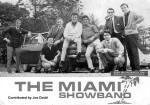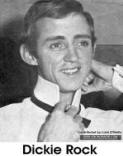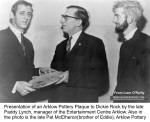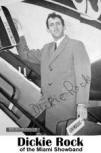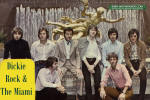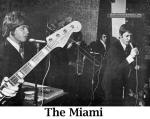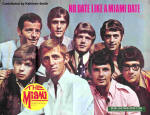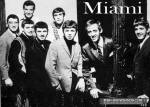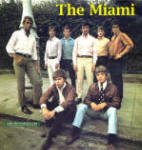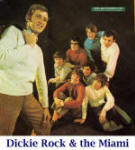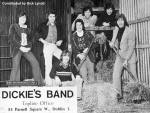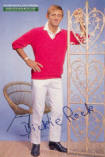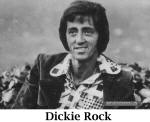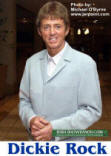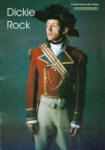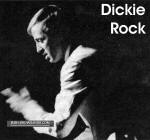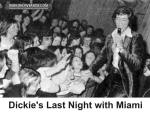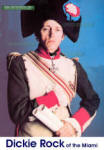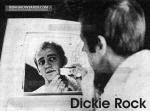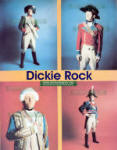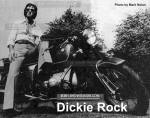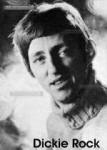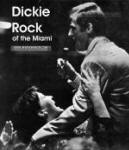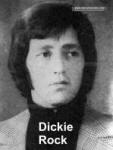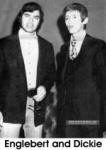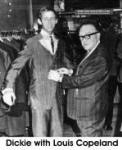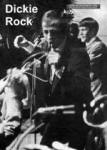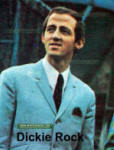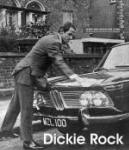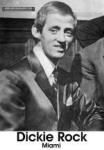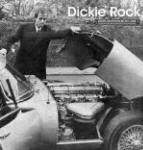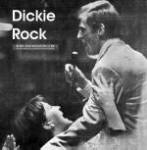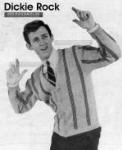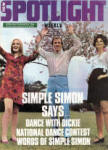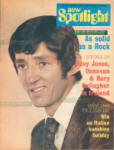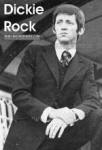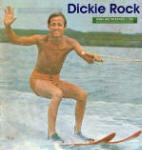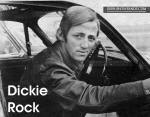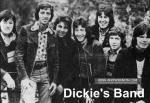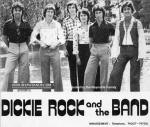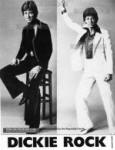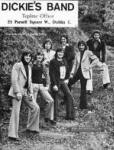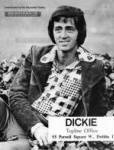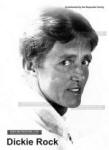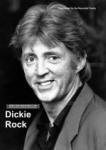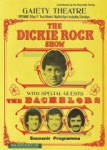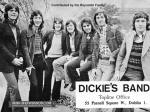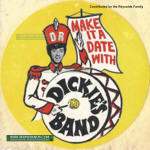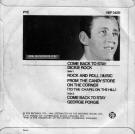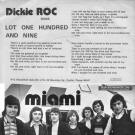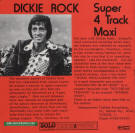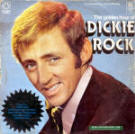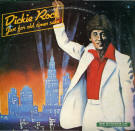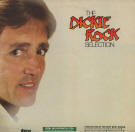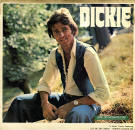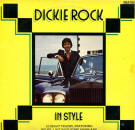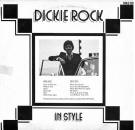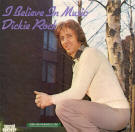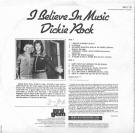Dickie Rock - RIP (Active: 1958-2024)
Bands: Melochords
• Miami Showband • Dickie's Band •
Cabaret
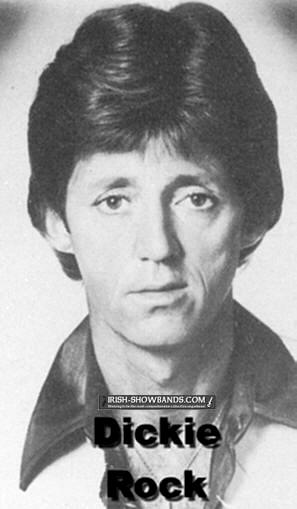 Like
the late Brendan Bowyer and a handful of other artists, Dickie Rock has
transcended the ranks of showband vocalist to that of legend. During
a twenty year stretch from 1963 through 1983 he had more hit singles
in Ireland than any other Irish artist except Brendan Shine and all
but the five of the world's greatest International acts.
Like
the late Brendan Bowyer and a handful of other artists, Dickie Rock has
transcended the ranks of showband vocalist to that of legend. During
a twenty year stretch from 1963 through 1983 he had more hit singles
in Ireland than any other Irish artist except Brendan Shine and all
but the five of the world's greatest International acts.
Dickie's story started in his home town of
Cabra West, outside of Dublin. Dickie started as an apprentice
welder, but at an early age, he was already
singing in the church choir.
Dickie's early career is a little tough to pin
down as research from newspaper archives tells a somewhat more
complicated story than Dickie's own story about his early career.
Between 1961 and 1962 he was listed in newspaper adverts as the lead
singer with no less than four different bands: The Strykas, the
Melochords, the Blackbirds and the Echoes.
The Melochords would go on to become the foundation for
the famous Cadets Showband which featured Eileen Reid, but Dickie
had already moved on. He also started a beat group, Dickie Rock and
the Echoes, but they were short lived. When Butch Moore left beat
group, The Blue Clavons, to join the Capitol, Dickie took the front
spot replacing Butch. Said Dickie of these times in a 1968
interview in Spotlight, "I was just dossing about, but really
I was trying to find myself."
What is for certain is that in Dickie's big break came in 1962, when the lead
singer for the fledgling Miami Showband, Jimmy Harte, emigrated to
the United States. Dickie auditioned for the job and when he was
accepted, the stage was set for one of the showband era's greatest
acts. Within a short span of time, Dickie and the
Miami were
competing directly with Brendan Bowyer and the
Royal showband,
trading hit records and record crowds wherever the two bands played.
Their first hit single was There's Always Me which hit number one
in the Irish charts in 1963.
Unlike Bowyer and other singers who imitated
the gyrations of Elvis, Dickie chose to emulate the great crooners
of the day like Sinatra and Bennett. His appeal was rooted in a sexy
gesture or a playful wink, not his good looks or athletic ability.
In 1964, Dickie and the Miami appeared at the
prestigious London Palladium alongside British superstar Petula
Clarke. Throughout the sixties, Dickie made hit record after
hit record. In 1965, Ireland entered it's first Eurovision song
contest and Dickie sang in the Irish National Song contest with "I
Still Love You," but lost out to Butch Moore who became Ireland's
first contestant. The following year, Dickie sang three songs in the
Irish Contest and finally broke through, being selected to represent
Ireland in Eurovision with "Come Back To Stay." Although he
would finished
fourth in the voting, his record was a number one hit in Ireland and
he returned to a hero's welcome. Dickie would sing in the Irish Song
contest again in 1969 (Now Do You Believe Me - 3rd place) and
finally in 1977 (I Can't Go On Without You - 6th place).
Despite these personal successes, all was not
well with Dickie and the
band. In 1967, the Miami split up with Murty Quinn and four other
members leaving to form the Sands Showband. They drafted young
Vampires vocalist Tony Kenny to front the band, leaving Dickie to
reform the Miami with an entirely new cast which included Fran
O'Toole, Des McAlea, and Paul Ashford (who would go on to the rock
band Stepaside years later). The new look Miami continued the band's
record of success and in 1968 Dickie had yet another number one hit
with "Simon Says."
Despite the fact that Dickie was so successful,
he wasn't getting rich in the business. In Vincent Power's book,
Send 'Em Home Sweatin, Dickie states, "I was on the same money
as the rest of the lads in the band, but I had five number one
records...during my time with the Miami, I didn't make anything like
the kind of money I should have made--nothing compared to what
Bowyer was making." The tension finally came to a head when, at
the end of 1972,
Dickie left the Miami to go out on his own and formed Dickie's Band
which was actually, Dublin band, The Arrows. He even stayed with the same manager, Tom Doherty, until 1975.
Dickie's second decade started with him
fronting his own band and although the dancing scene was changing,
he maintained his popularity by beginning to move into the growing
cabaret scene which was flourishing in Dublin and other venues around the country.
In late 1975, after the deaths of his former band mates in the Miami
massacre, Dickie swore he would never play the North again in an
interview with James Morrissey in Spotlight.
In 1977, Dickie had yet another
number one hit with "Back Home Again." By the time the ballroom
scene had ground to a halt and many of his peers had either thrown
in the towel or moved to the United States, Canada, or Europe to
salvage their careers, Dickie was already enjoying continued success
as Ireland's
number one cabaret act.
Through the nineties and today, Dickie remained
one of Ireland's most enduring entertainers. He continued to tour
and draw big crowds wherever he appeared. With the passing of so many
of the showband legends in the 2000's, Dickie had remained, along with
Brendan Bowyer, one of the main ambassadors for the bygone era of
the showbands. Sadly on December 6th, 2024 Dickie joined many of his
contemporaries when he passed away aged 88.
Photo Gallery
Click on a thumbnail for the full size image.
Discography:
Singles with the Miami:
There's Always Me / Boys -
#1 Irish Charts
Pye/Picadilly Records - 7N.35154 - November, 1963
I'm Yours /
Please Don't Drag That String Around - #1 Irish
Charts
Pye/Picadilly Records - 7N.36185 - March, 1964
From The Candy Store On The Corner / Twenty Flight Rock - #1 Irish
Charts
Pye/Picadilly Records - 7N.35202 - September, 1964
Just for Old Times' Sake / Me Not You -
#2 Irish Charts
Pye Records - 7N.15729 - December, 1965
Round and Around / Little Baby - #2 Irish Charts
Pye Records - 7N.15750 - January, 1965
Every Step of the Way / Rock n' Roll Music
-
#1
Irish Charts
Pye Records - 7N.15855 - May, 1965
I Left My Heart in San Francisco / One by One -
#4
Irish Charts
Pye Records - 7N.15891 - August, 1965
Wishing It Was You / Georgie Porgie
-
#1
Irish Charts
Pye Records - 7N.15977 - October, 1965
Come Back To Stay / Can't Make Up My Mind
-
#1
Irish Charts
Pye Records - 7N.17063 - February, 1966
Darling I Love You / Suspicion
-
#4
Irish Charts
Pye Records - 7N.17206 - November, 1966
When You Cry / To Whom It Concerns
-
#7
Irish Charts
Pye Records - 7N.17253 - January, 1967
Baby I'm Your Man / Mairzy Doats And Dozy Doats
-
#13
Irish Charts
Pye Records - 7N.17316 - May, 1967
Simon Says / Somebody Else Is Taking My Place
-
#1
Irish Charts
Pye Records - 7N.17527 - June, 1968
Christmas Time and You
/ The Little Boy Santa Forgot
-
#10
Irish Charts
United Artists Records - UP.2256 - November, 1968
The Wanderer / Uncle Tristian's Moonship
Target Records - 7N.17806 - 1969
Emily / Waterfall -
#12
Irish Charts
United Artists Records - UP.3507 -
April, 1969
Burning Bridges / Run To The Clown
Pye Records - 7N.45014 - 1970
When My Train Comes In / Day by Day -
#15
Irish Charts
Pye Records - 7N.17966 - July, 1970
My Heart Keeps Telling Me / We Did It Together
Pye Records - 7N.45062 - May, 1971
Cathedral In The Pines / Go -
#15
Irish Charts
Pye Records - 7N.60005 - October, 1971
Till Mini Monster EP / Just For Old Times Sake / Georgie Porgie / The
Candy Store -
#9
Irish Charts
Pye Records - PMM.601 - January, 1972
Lollipops, Lace and Lipstick / When You Cry
Pye Records - 7N.60024 - September, 1972
Lot 109 / Teardrop on Teardrop
Pye Records - 7N.45137 - 1972
Solo Singles
The Last Waltz
Pye Records - May, 1973
Maxi Single
Solo Records - December, 1973
Whoever Finds This
Solo Records - SOLO 138 - August, 1975
Back Home Again
-
#1
Irish Charts
Solo Records - May, 1977
It's Almost Like A Song / Now That My Love Has Gone
-
#18
Irish Charts
Solo Records - SOLO 151 - March, 1978
Coward of the County / She believes in Me
-
#11
Irish Charts
Release Records - RL.995 - January, 1980
Here In My Heart / Yours
Phillips Records - 6156-026 - 1982
When The Swallows Come Back From Capistrano -
#24
Irish Charts
Phillips Records - August, 1982
The Wedding -
#18
Irish Charts
Records Services - September, 1988
I'll Never Stop Wanting You / Instrumental Version -
#10
Irish Charts
Chart Records - PZA 046 - February, 1989
Come Home To Ireland for Christmas -
#25
Irish Charts
Chart Records - November, 1989
Albums with the Miami:
The Miami All-Stars on
Marble Arch - MAL 700 - 1967
Ten Of The Best
Marble Arch Records - MAL 750 - 1967
The Wind Will Change Tomorrow
PYE Golden Guinea - GGL 0452 - 1970
Dickie Rock & The Miami Showband
Hallmark Records - HMA 233 - 1972
Solo Albums:
Till
Harp Records - HPE 624 - 1980
Dickie
Solo Records - SOLO 7008
Audio Clips
Coming Soon
Back

 Like
the late Brendan Bowyer and a handful of other artists, Dickie Rock has
transcended the ranks of showband vocalist to that of legend. During
a twenty year stretch from 1963 through 1983 he had more hit singles
in Ireland than any other Irish artist except Brendan Shine and all
but the five of the world's greatest International acts.
Like
the late Brendan Bowyer and a handful of other artists, Dickie Rock has
transcended the ranks of showband vocalist to that of legend. During
a twenty year stretch from 1963 through 1983 he had more hit singles
in Ireland than any other Irish artist except Brendan Shine and all
but the five of the world's greatest International acts.


